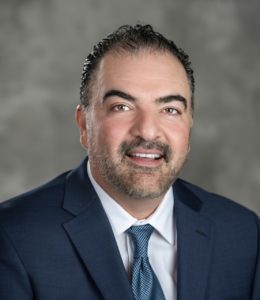Provider Spotlight: Dr. Mahmood Shahlapour, Dignity Health
 Dr. Mahmood Shahlapour is a hospitalist with Pioneer Hospitalist Group, working with the Dignity Health network out of Mercy Gilbert Hospital in Chandler, Arizona. Two years ago, he was introduced to Dignity Health Home Recovery Care, a program that transfers eligible patients home to receive hospital-level care.
Dr. Mahmood Shahlapour is a hospitalist with Pioneer Hospitalist Group, working with the Dignity Health network out of Mercy Gilbert Hospital in Chandler, Arizona. Two years ago, he was introduced to Dignity Health Home Recovery Care, a program that transfers eligible patients home to receive hospital-level care.
He recalls it was a paradigm shift: “I was kind of skeptical—and not sure how the transition would [work] from inpatient to taking care of patients at home. There were a lot of questions.”
But he says he believes in always giving new programs a try. “I remember my very first patient. She did not want to be in the hospital, but she needed IV antibiotics, because she had pyelonephritis,” he shares. “So, she was going to sign out against medical advice. I told her, ‘I want you to give this program a try, because they can still treat you like you’re in the hospital—watch your vitals, check your labs, and treat you with IV antibiotics.’”
That patient accepted admission to the Home Recovery Care program, and Dr. Shahlapour says, “I had follow-up with her, and she was so happy about what we did for her, and she had great results. After that I started using the program more and more.”
As he’s continued to refer patients to the program, Dr. Shahlapour notes, “[If patients turn down care] they wind up coming back sicker; this way they get the care they need but they’re at home where they want to be.”
He also says that the technology used in the Home Recovery Care program is a perk: “The patients like it, they don’t have to go wait in a doctor’s office, even as a follow-up. They get the same care. It’s the wave of the future. You get all the vitals; you have all the data there.”
“The outcomes are positive,” he says. He has noticed that at times, patients who have been transferred to a SNF or home health must return to the hospital due to complications, but “I haven’t had any patients with this that have had to be readmitted. That’s interesting.”
Along with the positive patient outcomes, Dr. Shahlapour also notes that the Home Recovery Care program has been beneficial for providers. “During COVID, it was very helpful for us, because we had such a shortage of nursing and a shortage of beds,” he related. “During a time of need the program provided all that extra care we needed and extra beds. After that I was pretty much sold.”
He continued, “The transition to home is so easy for us [as providers]. It becomes easier than even sending someone to a SNF, or a case manager sending someone to home health, because it takes all that stuff off our plate. It makes my life much easier considering the high census I have…there’s no delays.”
A big part of this, he says, is the way the model itself is set up, with a dedicated team of “top-notch” physicians available to interact with referring hospitalists. “They’re so easily accessible to communicate with you, and I know each one personally,” he says. “I think that’s the driving force– what kind of doctors you have, and what kind of nurses you have. Because you can have the best program, but without the right providers it won’t work.”
Ultimately, Dr. Shahlapour says he hopes other physicians will be open to the program. “They shouldn’t consider this by any means a competition. It’s an added service. I see us working hand in hand together.”
